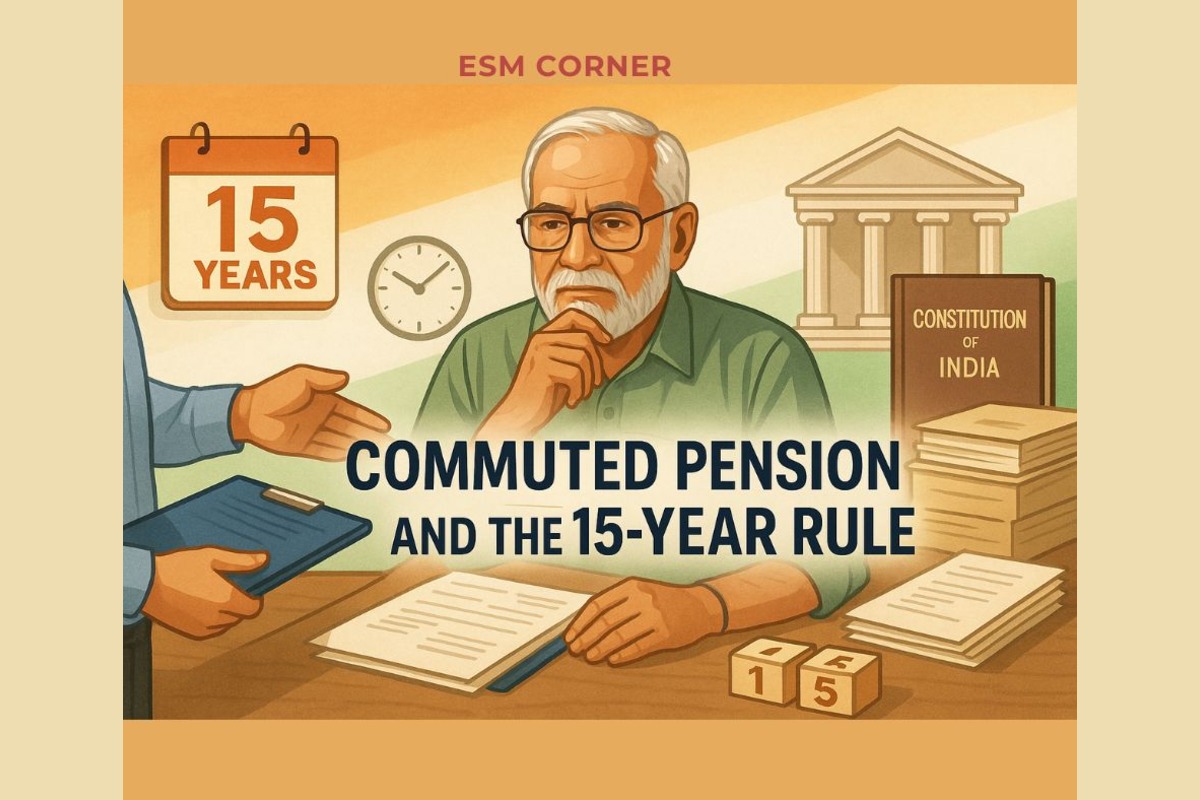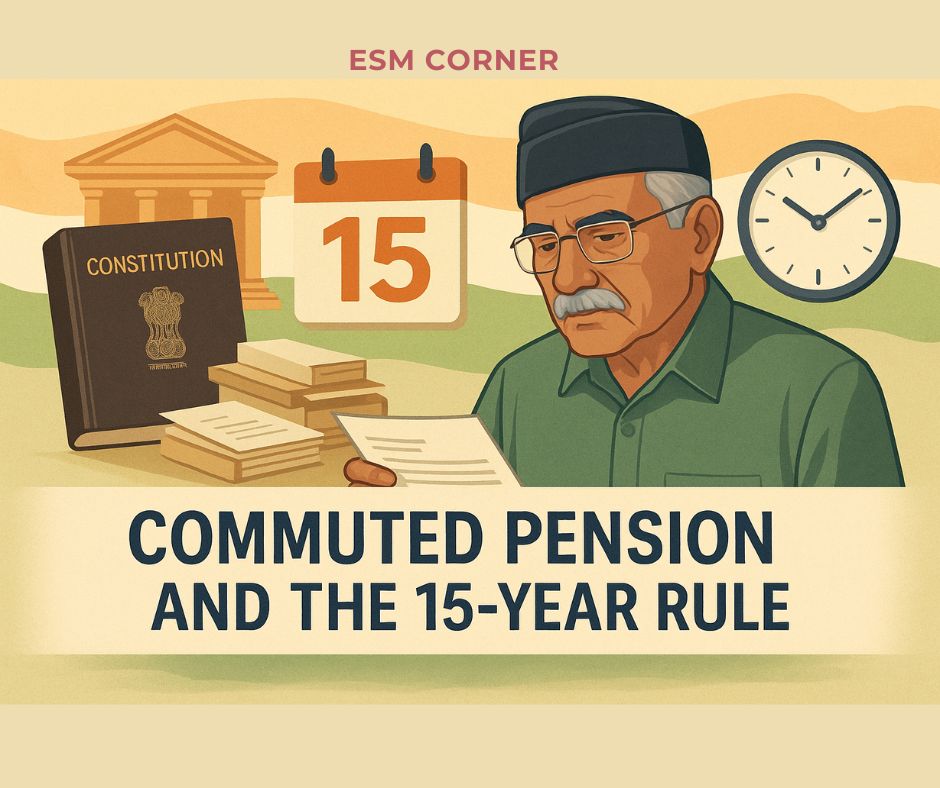
Many pensioners often wonder why the commuted portion of their pension is restored only after 15 years and not sooner — such as after 12 years
This has been a subject of extensive discussions, legal petitions, policy representations, and debates among pensioners and welfare associations for years. While the desire for an earlier restoration of pension is understandable from the pensioners’ standpoint, the current 15-year rule is not arbitrary. It has a deep legal, financial, and policy-based foundation rooted in the pensioners commutation recovery period.
Let us understand the historical background, legal basis, and current policy position regarding the restoration of commuted pension and how it relates to the pensioners commutation recovery period.
What is Commutation of Pension?
Commutation of pension means a retiring government employee chooses to take a part of their pension amount as a one-time lump sum instead of receiving it monthly This option is exercised at the time of retirement, usually to meet financial needs like loan repayment, property purchase, medical expenses, or family commitments.
For instance, if a pensioner decides to commute 40% of their pension, that portion is paid out as a lump sum at the time of retirement, while the remaining 60% continues to be disbursed monthly However, the monthly pension received thereafter is reduced by that commuted portion for a specific number of years. After this period—defined by the pensioners commutation recovery period—the full pension is restored.
The question is: how long should this reduced pension continue? Currently, the answer is 15 years.
Historical Background: Why Pensioners Commutation Recovery is 15 Years?
The current 15-year rule has its legal foundation in the landmark Supreme Court judgment dated 9 December 1985 in the case titled:
“Common Cause Society & Others vs Union of India” [1986 (1) SCC 142]
In this case, the Hon’ble Supreme Court considered several technical factors such as:
- Interest rates applicable to the commuted amount
- Mortality rates (life expectancy)
- Commutation tables used to calculate the lump sum
After analyzing these actuarial aspects, the Court concluded that a 15-year period is fair and reasonable for the restoration of the commuted portion of pension. This judgment effectively established the pensioners commutation recovery period as 15 years. This gave a firm legal basis to the 15-year rule, which has been followed consistently ever since.
Continued Demands for Early Restoration
Despite the Supreme Court’s ruling, the demand for early restoration has persisted. Pensioners and associations have argued that with increased life expectancy and modern medical care, the government is often able to recover the full commuted amount within 12 years, including interest.
They have pointed out that in some sectors, such as banking and public sector undertakings, commuted pension is restored earlier than 15 years. This has reignited the debate over the fairness and accuracy of the pensioners commutation recovery period, and led to several petitions demanding that the rule for Central Government pensioners also be revised.

Legal Challenges Post-1985
1. FORIPSO Case in Delhi High Court (2015–2019)
One major legal challenge came from the Forum of Retired IPS Officers (FORIPSO), which filed W.P. (C) No. 1222/2015 in the Delhi High Court. Their core demand was:
Commuted pension should be restored after 12 years, not 15.
The Delhi High Court, in its judgment dated 17 January 2019, ruled that:
- Pension and commutation are matters of government policy
- These are usually decided upon recommendations of the Pay Commissions
- Courts should not interfere unless there is a clear violation of fundamental rights
Hence, the petition was dismissed.
FORIPSO then approached the Supreme Court through SLP (C) No. 8052/2019. On 15 April 2019, the apex court refused to interfere, stating:
“The Supreme Court found no grounds to challenge or overturn the decision delivered by the Delhi High Court.”
Thus, the 15-year pensioners commutation recovery period was reaffirmed by the Supreme Court.
2. Punjab & Haryana High Court (2024)
A similar challenge was made before the Punjab & Haryana High Court in CWP No. 9426 of 2023 (O&M), which clubbed over 800 writ petitions on the same issue. The petitioners claimed that the full amount is recovered within 12 years and therefore restoration should happen sooner.
The High Court, in its order dated 27 November 2024, did not grant any relief to change the rule. It only stayed recovery proceedings temporarily through an interim order. However, it did not contradict the earlier Supreme Court and Delhi High Court judgments regarding the pensioners commutation recovery period.
Government’s Stand: Office Memorandum of 23 July 2025
In response to ongoing representations, the Department of Pension & Pensioners’ Welfare (DoPPW) issued an Office Memorandum on 23 July 2025, clearly stating the following:
- The matter has been settled by the Hon’ble Supreme Court and does not warrant further litigation
- The 15-year rule is based on policy and actuarial calculations as endorsed by the judiciary
- Any change in restoration period can only come through a policy decision by the Government, not by court order
Hence, as per current rules and legal position, the commuted portion of pension will be restored only after 15 years from the date of commutation. This aligns with the currently accepted pensioners commutation recovery period.
Understanding the Financial Logic
Pension commutation is not a free grant. It is an advance payment calculated on the basis of life expectancy and interest rate. When a pensioner commutes a portion of pension, the government effectively gives out money today that it would otherwise pay over time.
To protect its financial interest, the government needs to recover this amount with imputed interest, and this calculation is embedded in the commutation tables. According to these, it typically takes around 15 years for the recovery of the full amount, considering the cost of funds and life expectancy. This timeline defines the pensioners commutation recovery period in financial terms.
Can the Rule Ever Change?
Yes, but only through a policy decision by the Government of India. For this, the following steps are needed:
- A thorough actuarial review of current life expectancy and interest rates
- Recommendation by a Pay Commission or expert committee
- The Ministry of Finance and the Department of Pension & Pensioners’ Welfare (DoPPW) have acknowledged and put into effect the necessary measures
Until such steps are taken, the existing 15-year pensioners commutation recovery period remains legally binding.
Conclusion: What Pensioners Must Know
- The 15-year restoration rule is not arbitrary; it is legally validated and policy-backed
- Multiple courts, including the Supreme Court, have upheld its validity
- Only the Government, through a policy change, can reduce this period to 12 years
- Until then, representations and advocacy should focus on persuading the government, not legal battles
Final Word
For pensioners and their families, understanding the logic and legality of the 15-year rule is crucial. While it may seem burdensome, the rule is based on sound financial and actuarial principles. Efforts to reduce this period must now be made through policy-level engagement with ministries and pay commissions, not through courts.
Until any such change is announced, the official rule stands unchanged: the commuted portion of pension will be restored only after 15 years, as per the pensioners commutation recovery period.
ALSO READ I 10 MUST-KNOW BENEFITS AND UPDATES FROM THE DIRECTORATE OF CANTEEN SERVICES IN 2025






[…] Please open the attached file below 👇 https://esmcorner.com/pensioners-commutation-recovery-and-15-year-rule/#:~:text=ESM%20CORNER,Exit%20… […]
It means the recovery will be more than the Commuted Pension if 15 years horizon is followed. Basic Pension will be restored but what about the excess recovery ? I am a retired bank employee but my bank never provided me with Statement of Commutation Recovery, Why ? Government says it is not court’s prerogative, court says it is Government’s policy that can change the 15years clause but Judges of the courts have requested the Government to restore it earlier. It means in reality the recovery is complete before 15 years then it is unfair to continuethe recovery upto 15 years. Government must dismiss the 15 year policy and give respite to all the pensioners who have availed Commutation Scheme.
If the period of commutation is reduced to 12 yrs from 15 yrs ,the recovery rate from pensioner would also increase,which would also be objected by the pensioners.
Let the old rule follow esp when now the retirement or Non Effective amt is substantial.
Even if it is after 15 years,if it is not paid so far, please consider to pay at the earliest.
This subject going a long and long go but no decision and this government I hope do something if somebody thinking this competition only for army Navy airport it’s not? It is all of our Central Government retired person.
government should fix 12 yeras commute rules not for 15 yeras long term.
Waiting for good result over commuted rules. Thanks